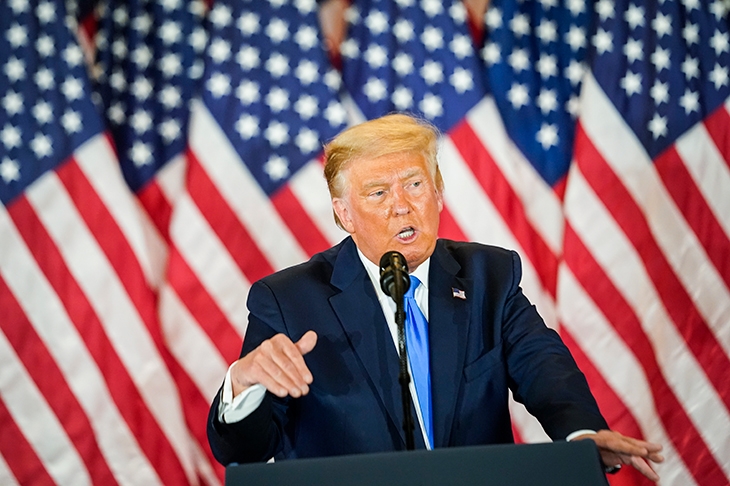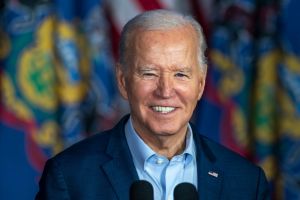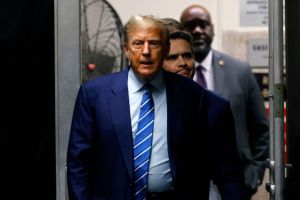London
American expats have a conundrum on election night: do you stay up to watch the results come in or do you try to sleep? On the one hand, the future of your country is at stake — and in the pre-COVID era, there was the added glamour of election night parties and free booze. On the other hand, if your side loses, you’re miserable and exhausted. Of course I stayed up. Four years ago I watched hundreds of party guests flee the US Embassy in London in a matter of minutes after Florida declared for Donald Trump, trampling over Hillary badges and stickers on their way out. This year I spent the night alone with Bret Baier in my living room.
It would appear that even after four years, no one has solved the Trump riddle. He insults people and degrades them; he encourages everyone to inject bleach. So the question presents itself again: how did a man, seen by even his supporters as being unfit for office, still win roughly half the country? I’m a lifelong Republican who felt I had to vote for Joe Biden — and I’m not alone. He’s the first candidate in American history to win more than 70 million votes. I felt vindicated watching the first debate as Trump shouted down and interrupted his opposition. But when Biden was allowed to speak in the second debate, he became his own worst enemy. We heard about the tax hikes, more lockdowns and a move away from US energy-independence and fracking. I still back Biden but his policies will have driven many wavering voters back to Trump. In retrospect, the tell was in the lackluster Biden rallies. The issue wasn’t simply social distancing, but the gloomy optics it created and the strange lack of enthusiasm. A few weeks back, a TV news network ran images of Biden and Trump rallies side by side. The clip was designed to contrast the former VP’s thoughtful event with the President’s dangerous one. What it did in practice was to show viewers two different glimpses of the future: one in which people stood in a bubble marked with tape, draped in PPE, listening to an old man in a mask, the other in which patriotic crowds cheered happily and waved flags. In some ways it was Trump who offered a return to normality.
Perhaps it wasn’t the debates or the rallies but the sheer success of the US economy for most of Trump’s presidency that made this race far closer than predicted. Several exit polls put the economy far ahead of other issues on the list of what concerned voters most. One poll showed that twice as many now worry about the economy than they do the virus. And on the economy, Trump’s record is pretty good. For the first time in a long while GDP isn’t just a number on a spreadsheet: Americans could see the gains reflected in their own lives. Median income last year was the highest on record. The tax cuts resulted in wage hikes and bonuses for employees across the country. In 1992, James Carville, Bill Clinton’s strategist, coined the phrase ‘It’s the economy, stupid’ and wrote it on the campaign headquarters’ wall.
[special_offer]
News of Britain’s second lockdown has rippled through America and reached my friends and family. They want to make sure that, as a singleton living alone, I’m okay — and they’re desperate to avoid another lockdown themselves. Biden’s campaign against Trump’s handling of COVID seems to have helped him in states like Arizona, which the Democrats have won for only the second time since the 1940s. But in other parts of the country, the Democrats’ focus on the virus turned the election into a referendum on opening up or closing down for the second time.
Donald Trump often has the perfect opportunity to play the statesman, to rise above partisan bile. He always turns these opportunities down. His inauguration in early 2017 was the perfect moment to urge unity but instead he described American ‘carnage’. During his election-night speech on Tuesday he pre-declared victory and asked for the vote counting to stop. This was his chance to go down with dignity or to win with magnanimity. He chose neither.
Such a surprise result tells us one thing with certainty: America is changing. Demographics are shifting fast, people are voting in ways that confound the assumption of pollsters. Once again, the consensus has been upended. Perhaps this is a good thing. ‘Where all think alike,’ said American journalist and Pulitzer-prize winner Walter Lippmann, ‘no one thinks very much.’ It’s equal parts exciting and daunting to think that anything could change and everything is possible. But that, in essence, is America. It’s always worth staying up for.
This article was originally published in The Spectator’s UK magazine. Subscribe to the US edition here.


















